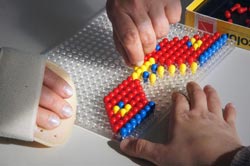More Mobility – Due to Deafferentation

In the ‘Constraint-Induced Movement Therapy’ (CIMT) the healthy arm is being restrained in a cuff, while the stroke-affected arm and hand are intensely training fine motor skills.<br><br>Photo: Jan-Peter Kasper/FSU<br>
Painkilling drugs that make many therapies possible are a blessing for patients. Thanks to modern anesthetics, not only can surgical operations be conducted without causing pain, they are also used for various diagnostic procedures.
Anesthetics can be very useful in therapies for stroke patients, as psychologists and physicians of the Friedrich Schiller University Jena (Germany) and the University Hospital Jena are now able to prove.
In the ‘Journal of Neuroscience’ (DOI:10.1523/JNEUROSCI.5912-11.2012) the researchers present the results of their study, showing how a local anesthetic can distinctly improve the motor skills of patients after a stroke.
“Many stroke patients suffer from chronic impairment of the hand or of the complete arm,” Professor Dr. Thomas Weiss explains. Together with expert colleagues the psychologist of the department of Biological and Clinical Psychology at Jena University has been working for a number of years on a specialized medical training therapy which clearly enhances the mobility of stroke patients. In the ‘Constraint-Induced Movement Therapy’ (CIMT) the healthy arm is being restrained in a cuff, while the stroke-affected arm and hand are intensely training fine motor skills. Patients are asked to carry out tasks such as stacking small toy blocks or putting tiny pins into a perforated board. Daily activities like washing one’s hand are part of the training.
“Nearly every affected person benefits from this training,” Weiss‘s colleague Prof. Dr. Wolfgang Miltner says. The chair of Biological and Clinical Psychology developed the therapy together with American colleagues and refers to the comprehensive study results about the efficiency of the program. “We are happy to carry out this therapy on many patients – together with our colleagues from the psychology department in the neurological day hospital,” the director of the clinic for Neurology, Prof. Dr. Otto Witte, stresses.
In addition, the impact of the exercise therapy could be clearly enhanced when the sensitivity of the affected arm was lowered by an anesthetic, as the interdisciplinary Jena team was able to demonstrate. In their study, the scientists examined 36 patients. Half of the patients had a local anesthetic cream applied on their forearms. Meanwhile the other patient group only received a placebo. Afterwards, both patient groups went into their exercise therapy for a day.
“Unsurprisingly, the motor performance of all patients was strongly enhanced,” Prof. Weiss commented on the result. “Beyond that, it became obvious that the patients who received the anesthetic benefited even more than the placebo group,“ Weiss says. The researchers could show the reason for this effect using magnetoencephalographic imaging (MEG) of the patients. The temporary interruption of nerve impulses from the forearm leads to a decreasing activity in the brain areas processing these impulses. “At the same time neighboring brain cells are activated more strongly,” the Jena Psychologist explains. Thus the brain reacts to the missing impulses from the forearm with an increased sensitivity in the hand as the MEG images showed. Consequently the motor performance improves as well. “This process starts within minutes,” Thomas Weiss says.
A subsequent study is going to show whether the combination of local anesthetics and therapeutic exercise will improve the mobility of stroke patients in the long term.
Original Publication:
Sens E. et al.: Effects of Temporary Functional Deafferentation on the Brain, Sensation, and Behavior of Stroke Patients, Journal of Neuroscience Vol. 32 (34): 11773-11779, DOI: 10.1523/JNEUROSCI.5912-11.2012
Further information about ‘Constraint-Induced Movement Therapy’ (CIMT) can be found at: http://www.taubsches-training.uni-jena.de.
Contact:
Prof. Dr. Thomas Weiss
Institute of Psychology
Friedrich Schiller University Jena
Am Steiger 3 / Haus 1, D-07743 Jena
Germany
Phone: ++49 3641 / 945143
Email: weiss[at]biopsy.uni-jena.de
Media Contact
More Information:
http://www.taubsches-training.uni-jena.deAll latest news from the category: Health and Medicine
This subject area encompasses research and studies in the field of human medicine.
Among the wide-ranging list of topics covered here are anesthesiology, anatomy, surgery, human genetics, hygiene and environmental medicine, internal medicine, neurology, pharmacology, physiology, urology and dental medicine.
Newest articles

Properties of new materials for microchips
… can now be measured well. Reseachers of Delft University of Technology demonstrated measuring performance properties of ultrathin silicon membranes. Making ever smaller and more powerful chips requires new ultrathin…

Floating solar’s potential
… to support sustainable development by addressing climate, water, and energy goals holistically. A new study published this week in Nature Energy raises the potential for floating solar photovoltaics (FPV)…

Skyrmions move at record speeds
… a step towards the computing of the future. An international research team led by scientists from the CNRS1 has discovered that the magnetic nanobubbles2 known as skyrmions can be…





















